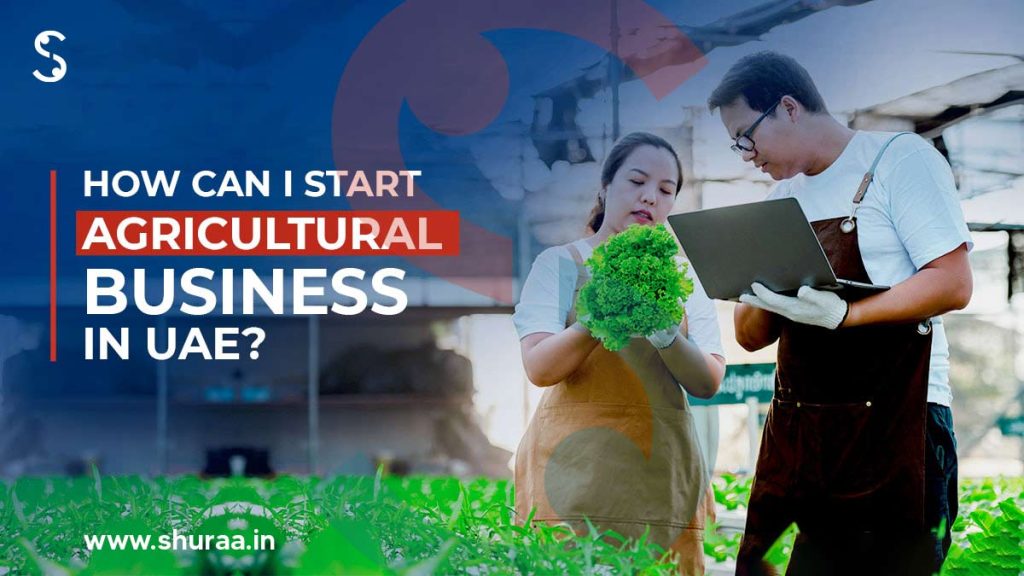In a country known for its deserts and skyscrapers, the rise of the agricultural business in the UAE might come as a surprise, but it’s genuine and growing fast. Driven by the government’s strong focus on food security, sustainability, and innovation, the UAE has transformed itself into a hub for modern farming techniques like hydroponics, vertical farming, and agri-tech startups.
For Indian entrepreneurs and investors, this shift presents a golden opportunity to start a farming business in the UAE, backed by government incentives, advanced infrastructure, and an ever-growing demand for locally produced food.
So, if farming investment in the UAE is on your mind, this blog will guide you through the entire journey, right from understanding the market potential to navigating licenses, costs, and the setup process.
What is an Agriculture License in Dubai, UAE?
An Agriculture License in Dubai, UAE, is a legal permit issued by relevant authorities, such as the Dubai Department of Economy and Tourism (DET) or Dubai Municipality, that allows individuals or companies to operate within the agricultural sector. This license covers a broad range of activities, including crop production, greenhouse farming, aquaculture, organic agriculture, and livestock rearing.
With the UAE government actively promoting food security and sustainable farming practices, getting an agri-business license in Dubai has become a strategic step for Indian entrepreneurs and investors. Whether you're planning to start a farming business in the UAE or expand into agro-tech solutions, the license is your first step toward legitimate operations.
Is it Profitable to Start an Agriculture Business in Dubai, UAE?
Yes, starting an agriculture business in Dubai, UAE, can be profitable if approached strategically. With the UAE government heavily investing in food security and sustainable agri-tech solutions, the region has become a hub for innovation in agriculture. From hydroponics to vertical farming and controlled environment agriculture, businesses that embrace modern technologies are seeing strong growth.
One of the main drivers behind this trend is the country’s increasing demand for local, fresh produce. The UAE currently imports a significant portion of its food, so local production presents a cost-effective, eco-friendly alternative that’s both government-supported and consumer-driven.
If you're planning to start a farming business in the UAE, you’ll benefit from tax incentives, free zone options, and growing B2B opportunities with retailers, hotels, and exporters. Moreover, government-backed initiatives like the National Food Security Strategy 2051 further boost investor confidence in the sector.
Benefits of Starting an Agricultural Business in the UAE
The following are some of the benefits an Indian agricultural business can leverage in the UAE:
1. Innovative Agricultural Technologies
Through the intelligent application of green technologies, the UAE has been revising its approach toward food security. As a result, there have been many developments in agricultural technology, urban agriculture, sustainable agriculture, and precision agriculture.
2. Ease of Doing Business
Apart from economic and political stability and efficient supply chain management, the UAE has an impressive ease-of-doing-business ranking. Thus, setting up an agricultural company is hassle-free with almost no paperwork.
3. Advanced Infrastructure
The UAE is a land of impressive technological advancements, infrastructure, and amenities. Moreover, it has an efficient transportation network within and beyond the country.
4. Prime Location
Your agricultural business can leverage the UAE’s premium location on the new Southern Silk Road between Asia, Europe, and Africa, providing favourable trading conditions.
5. Educational Support
Your business can reap benefits from seminars and courses on advanced farming practices that the Ministry of Climate Change and Environment conducts.
6. Value Addition to Products
Most farmers and farm owners are incapable of producing customer-centric commercial products. Your agricultural business in the UAE can facilitate their production, adding value to their products.
7. Skilled Workforce
The UAE has one of the world’s most talented workforces specialising in supply chain management, value-addition, marketing, distribution, and microfinance, among others.
8. Rising Consumer Demand
Recently, there has been a significant change in consumer needs. The rising demand for premium organic goods in Dubai has increased the scope for agricultural businesses.
9. Attractive Tax Incentives
You can enjoy almost 0% taxes, full ownership of your business, and 100% return of your invested capital and profits. However, entrepreneurs must pay a 5% import duty on a few products.
Types of Agricultural Activities in Dubai, UAE
Dubai, despite its arid desert climate, has made significant progress in advancing modern agricultural practices. The government has actively encouraged innovation in food production, making the UAE a regional hub for agri-tech and sustainable farming. Here's a breakdown of the types of agricultural activities in Dubai, UAE:
1. Greenhouse Farming
- What it is: Cultivation of vegetables, herbs, and fruits in controlled environments.
- Popular crops: Tomatoes, cucumbers, lettuce, bell peppers, and herbs.
- Why it's growing: Helps manage extreme heat and water scarcity, increasing yield and efficiency.
2. Aquaponics & Hydroponics
- Aquaponics: Combines fish farming with hydroponic plant cultivation using a closed-loop water system.
- Hydroponics: Soil-less cultivation of plants using nutrient-rich water.
- Used for: Leafy greens, strawberries, herbs.
- Key advantage: Water-efficient, ideal for desert agriculture.
3. Livestock Farming
- Activities include: Rearing of cows, goats, sheep, and poultry.
- Purpose: Dairy products, meat, and eggs.
- Modern facilities: Automated feeding, climate-controlled barns, and biosecurity measures.
4. Beekeeping (Apiculture)
- Purpose: Honey production and pollination.
- Why it’s viable: Supported in certain eco-friendly zones with suitable flora.
- Growing trend: Organic and local honey demand.
5. Date Palm Cultivation
- Traditional but still dominant: Date palms are a historic and culturally significant crop.
- Export potential: High-quality Emirati dates are exported worldwide.
- Sustainability: Thrives in hot, dry climates with minimal water.
6. Organic Farming
- Focus: Chemical-free production of fruits, vegetables, and grains.
- Popular among: Health-conscious consumers and niche markets.
- Certifications: Farms often apply for organic certification under UAE standards.
7. Agri-Tech & Vertical Farming
- Modern methods: AI-driven crop monitoring, robotics, and climate control.
- Vertical farms: High-tech indoor farms growing crops in vertically stacked layers.
- Used for: Leafy greens, microgreens, herbs.
- Backed by: Government initiatives like the UAE Food Tech Valley.
8. Field Crops (in Select Areas)
- Location-specific: Al Ain and other inland regions support open-field farming.
- Crops: Barley, alfalfa (for animal feed), wheat (limited), corn.
- Irrigation dependent: Mostly reliant on advanced drip irrigation systems.
9. Horticulture & Landscaping Crops
- Purpose: Supplying ornamental plants and trees for landscaping projects.
- Market: Residential developments, commercial complexes, and public parks.
Dubai is reshaping desert agriculture with innovation and investment. From hydroponics to livestock and date palms to vertical farms, the agricultural business in Dubai is becoming increasingly diversified. If you're planning to start a farming business in the UAE, choosing the right agricultural activity is crucial based on resources, market demand, and sustainability goals.
Documents Required to Start an Agricultural Business in the UAE?
To start an agricultural business in the UAE, you'll need to submit several documents to the relevant authorities, especially if you're applying for a farming business license in Dubai or any other emirate. These documents are necessary for business registration, licensing, land use permissions, and compliance with environmental and food safety standards.
- Passport copies
- Visa copies
- Emirates ID
- No Objection Certificate (NOC)
- Trade Name Reservation Certificate
- Initial Approval Certificate
- Memorandum of Association (MoA)
- Lease agreement / Tenancy contract / Ejari
- Business Plan
- Irrigation and Soil Report
- Import/Export License
How to Start an Agriculture Business in Dubai in 2026?
With rapid urbanisation and a strong governmental push toward sustainable food production, the agricultural business in the UAE is transforming. Technologies like hydroponics, vertical farming, and innovative irrigation systems are reshaping traditional agriculture. If you're considering launching a farming venture in the region, now is the perfect time to act.
Step 1: Understand the Agriculture Sector in Dubai
Dubai’s climate challenges are now being tackled with modern solutions. From indoor farms to desert-based greenhouses, the UAE is turning limitations into opportunities. This creates a fertile ground (pun intended) for those looking to start a farming business in the UAE.
Step 2: Choose Your Business Activity
Decide on the type of agricultural activity you want to pursue:- Crop production (greenhouse farming, hydroponics
- Livestock or poultry farming
- Organic farming
- Agri-tech solutions
- Agricultural supply and distribution
Step 3: Select the Right Location
You can establish your agriculture business in either of the following:- Mainland Dubai (for direct access to local markets)
- Free zones like Dubai Industrial City or Dubai Science Park (ideal for agri-tech ventures and exports)
Step 4: Obtain an Agri Business License in Dubai
To legally operate, you must apply for an agricultural business license in Dubai from the Department of Economy and Tourism (DET) or the relevant free zone authority. The type of license depends on your agricultural activity.
Typical requirements include:- Trade name reservation
- Initial approval
- Detailed business plan
- Office/land lease agreement
- Approvals from the Ministry of Climate Change and Environment (MOCCAE)
Step 5: Secure Farming Land or Facilities
Depending on your business model, you may need to lease land for open-field farming or rent warehouse space for vertical or indoor farming setups.
Step 6: Investment and Funding Options
When planning your farming investment in the UAE, consider:- Capital costs for land, equipment, and operations
- Applying for government grants or subsidies
- Partnering with venture capital firms interested in agri-tech
Step 7: Compliance and Permits
Ensure compliance with local environmental laws, health regulations, and safety standards. You may need:
- Pesticide handling permits
- Water usage approvals
- Import/export certifications (if trading agricultural products)
The future of the agricultural business in the UAE is deeply tied to innovation and sustainability. With proper planning, acquiring an Agri business license in Dubai, and choosing the right model for your UAE agriculture company setup, you can build a profitable and impactful venture.
Whether you're looking to launch a vertical farm, invest in smart irrigation, or grow organic crops, the opportunities to start a farming business in the UAE in 2026 have never been more promising.
Cost of Starting an Agricultural Business in the UAE
Starting an agricultural business in the UAE can cost anywhere from AED 20,000 to AED 50,000* or more, depending on the type of farming activity and location. The Agri business license in Dubai alone may cost over AED 15,000*, with additional fees for approvals from environmental and municipal authorities.
Other key expenses include leasing farmland or greenhouses, setting up irrigation systems, conducting soil and vegetation surveys, installing storage and warehouse facilities, and managing utilities. You'll also need to budget for staffing, biological monitoring, and marketing your agricultural products.
Since every UAE agriculture company setup is unique, exact costs can vary significantly. Consulting experts like Shuraa Business Setup ensures a customised cost breakdown, helping you manage your farming investment in the UAE more efficiently and avoid unexpected financial hurdles.
Start Your Agricultural Business with Shuraa India
At Shuraa India, consultants can give you a hand in setting up your agricultural business. We can ease your entire business setup process. Moreover, we can make you sail through the many legal agricultural business setup requirements, such as appropriate documentation, licenses, approvals, and permissions. Apart from our business setup solutions, we can create special packages geared toward your specific business needs. You just need to get in touch with us!
Author
-

Kajol is a skilled writer and UAE corporate advisor with deep expertise in business consulting. She specializes in guiding entrepreneurs, simplifying UAE business setup, and navigating local regulations, market trends, and cultural nuances. Through her insightful blogs and practical advice, Kajol helps Indian and global entrepreneurs establish and grow their businesses in the UAE efficiently and successfully.
